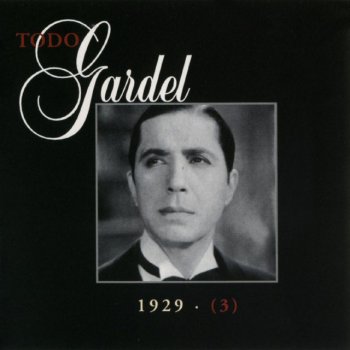Paroles et traduction Carlos Gardel - Calor De Hogar
Calor
de
hogar
Home
heat
Jesús
Fernández
Blanco,
"Martín
Gala"
y
"Gallego"
Jesús
Fernández
Blanco,
"Martín
Gala"
and
"Gallego"
Poeta.
Nació
en
Cuenca
de
Campos
(España)
el
15
de
febrero
de
1892
y
falleció
en
Buenos
Aires
el
14
de
noviembre
de
1963.
Carlos
Gardel
le
grabó
El
Barbijo",
así
como"Calor
de
Hogar"
con
música
de
Eugenio
Carrére.
Poet.
He
was
born
in
Cuenca
de
Campos
(Spain)
on
February
15,
1892
and
died
in
Buenos
Aires
on
November
14,
1963.
Carlos
Gardel
recorded
"El
Barbijo"
for
him,
as
well
as
"Calor
de
Hogar"
with
music
by
Eugenio
Carrére.
Eugenio
Carrere
Eugenio
Carrere
Músico,
pianista
y
compositor.
Nació
en
Bolívar
(Buenos
Aires)
el
19
de
septiembre
de
1901
y
falleció
en
El
Palomar
(Buenos
Aires)
el
11
de
agosto
de
1964.
Musician,
pianist
and
composer.
He
was
born
in
Bolívar
(Buenos
Aires)
on
September
19,
1901
and
died
in
El
Palomar
(Buenos
Aires)
on
August
11,
1964.
Tango
(398)
diciembre
11,
1929
Tango
(398)
December
11,
1929
Número
de
la
prueba
matriz
de
la
casa
grabadora
(Se
hicieron
2 pruebas
el
mismo
día:
5032
y
5032-1).
Nº
de
orden
de
publicación
o
de
grabación
de
la
primera
aparición
del
título:
587.
Nº
secuencial
de
grabación:
713
Number
of
the
recording
house
matrix
test
(2
tests
were
done
on
the
same
day:
5032
and
5032-1).
Order
of
publication
or
recording
of
the
first
appearance
of
the
title:
587.
Sequential
recording
Nº:
713
Número
de
serie
del
disco
original
18300
Lado
A.
Duración
02'27"
Original
disc
serial
number
18300
Side
A.
Duration
02'27"
Grabación
realizada
en
Buenos
Aires
para
el
sello
Odeón.
Acompañamiento
con
guitarras
de
Guillermo
Desiderio
Barbieri,
la
"segunda
guitarra",
el
"Negro"
Barbieri
era
el
más
antiguo
guitarrista
cuando
se
produjo
el
accidente
en
Medellín
(donde
murió).
Se
había
incorporado
en
1921,
cuando
aún
Gardel
actuaba
en
dúo
con
Razzano,
Gardel
lo
llamaba
"el
Barba",
fue
descubierto
en
la
ciudad
de
Lincoln,
en
la
provincia
de
Buenos
Aires,
en
el
transcurso
de
una
gira
del
dúo
Gardel-Razzano
por
el
interior
de
la
Argentina
y
José
María
Aguilar
este
último
incorporado
al
grupo
Gardel
en
1928.
El
debut
de
Aguilar
se
produjo
el
18
de
julio
de
1928.
Lo
llamaban
"el
Indio"
y
su
mal
genio
lo
llevó
a
dejar
el
acompañamiento
de
Gardel
en
varias
oportunidades,
aunque
siempre
volvía
después
de
su
enojo.
Recording
made
in
Buenos
Aires
for
the
Odeón
label.
Accompaniment
with
guitars
by
Guillermo
Desiderio
Barbieri,
the
"second
guitar",
the
"Negro"
Barbieri
was
the
oldest
guitarist
when
the
accident
occurred
in
Medellin
(where
he
died).
He
had
joined
in
1921,
when
Gardel
was
still
performing
in
a
duet
with
Razzano,
Gardel
called
it
"the
Beard",
it
was
discovered
in
the
city
of
Lincoln,
in
the
province
of
Buenos
Aires,
during
a
tour
of
the
Gardel-Razzano
duo
in
the
interior
of
Argentina
and
José
María
Aguilar
the
latter
joined
the
Gardel
group
in
1928.
Aguilar's
debut
came
on
July
18,
1928.
He
was
called
"the
Indian"
and
his
bad
temper
led
him
to
leave
Gardel's
accompaniment
on
several
occasions,
although
he
always
returned
after
his
anger.
Tema:
Amor
sereno,
de
hogar.
Felicidad.
Theme:
Serene
love,
from
home.
Happiness.
Dame
un
abrazo
mi
noble
esposa
Give
me
a
hug
my
noble
wife
Y
al
calorcito
del
duce
hogar
And
to
the
warmth
of
the
duce
hogar
Mientras
los
chicos
bailan
y
ríen
While
the
boys
are
dancing
and
laughing
Añoraremos
la
mocedad.
We
will
miss
the
youth.
¿Te
acuerdas
vieja,
de
aquella
tarde?
Do
you
remember,
old
lady,
that
afternoon?
Cuando
temblando
por
la
emoción
When
trembling
with
emotion
Y
acobardado
por
tu
belleza
And
cowed
by
your
beauty
Por
vez
primera
te
hablé
de
amor.
For
the
first
time
I
told
you
about
love.
Como
rojas
amapolas
Like
red
poppies
Tus
mejillas
vi
encender
I
saw
your
cheeks
turn
on
Y
tus
ojos
se
cerraron
And
your
eyes
closed
Como
flor
de
atardecer.
Like
a
sunset
flower.
De
tus
labios
incitantes
From
your
inciting
lips
Un
suspiro
hechó
a
volar
A
sigh
made
to
fly
Y
el
lucero
de
la
tarde
And
the
evening
star
Nuestras
bocas
vio
juntar.
He
saw
our
mouths
coming
together.
Felices
años
que
en
este
nido
Happy
years
that
in
this
nest
Dieron
sus
frutos
de
bendición
They
gave
their
fruits
of
blessing
Nuestros
hijitos
que
ya
son
hombres
Our
little
boys
who
are
already
men
Buenos
y
honrados
como
tú
y
yo.
Good
and
honest
like
you
and
me.
¡Como
han
crecido!
ya
tienen
alas
How
they
have
grown!
they
already
have
wings
Pronto
su
nido
querrán
hacer
Soon
their
nest
will
want
to
make
Y
solos
vieja
nos
quedaremos
And
alone
old
we'll
stay
Solos
y
tristes
con
la
vejez.
Lonely
and
sad
with
old
age.
Pero
nuevas
primaveras
But
new
springs
Han
de
dar
flores
de
amor
They
have
to
give
love
flowers
Y
vendrán
los
nietecitos
And
the
little
grandchildren
will
come
A
curar
nuestro
dolor.
To
heal
our
pain.
Con
sus
risas
y
sus
cantos
With
their
laughter
and
their
singing
Nuestra
vida
alegrarán
Our
life
will
rejoice
Y
después...
después
mi
vieja
And
after...
then
my
old
Nuestro
ojos
cerraran.
Our
eyes
will
close.
Évaluez la traduction
Attention! N'hésitez pas à laisser des commentaires.
